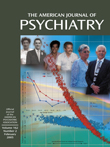Double-Blind, Placebo-Controlled, Multicenter Trial of Selegiline Augmentation of Antipsychotic Medication to Treat Negative Symptoms in Outpatients With Schizophrenia
Abstract
OBJECTIVE: The authors’ goal was to test the efficacy of selegiline augmentation of antipsychotic medication in outpatients with schizophrenia who had negative symptoms of moderate or greater severity. METHOD: A 12-week, double-blind, placebo-controlled, multicenter trial of oral selegiline augmentation of antipsychotic medication was carried out. Outpatients were chosen who did not manifest severe positive symptoms at baseline, who did not meet criteria for coexisting major depression, and who had been maintained on a stable regimen of antipsychotic medication. RESULTS: Negative symptoms were found to be significantly more improved in the patients who received selegiline, and global improvement scores reinforced the impression that selegiline augmentation was beneficial. CONCLUSIONS: These findings support further investigation of low-dose selegiline augmentation of antipsychotic medication in outpatients with schizophrenia who have at least a moderate burden of negative symptoms.



